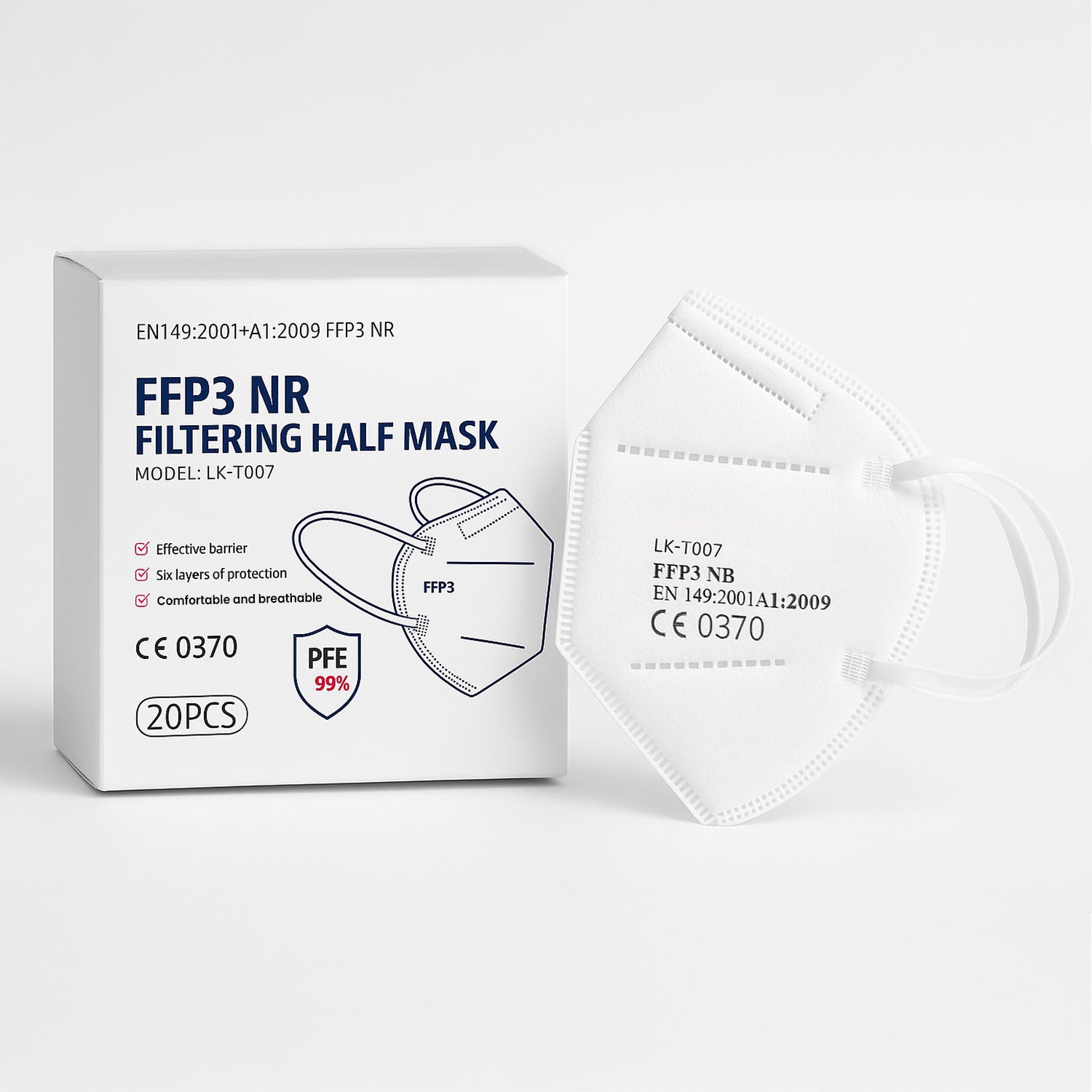In the world of healthcare, safety is not just a precaution – it’s a necessity. Among the many protective measures in place, FFP3 masks stand out as one of the highest standards of respiratory protection available. They are specifically designed to protect against the most dangerous airborne hazards, making them indispensable in the medical industry, especially in dental practices where aerosol-generating procedures (AGPs) are common.
What is an FFP3 Mask?
An FFP3 mask (Filtering Face Piece class 3) is a type of respirator mask that meets the highest level of filtration under the European EN 149 standard. It offers protection against both liquid and solid airborne particles, including viruses, bacteria, and fine dust. FFP3 masks filter at least 99% of airborne particles down to 0.3 microns, making them ideal for situations with a high risk of exposure to hazardous pathogens.
Unlike simple surgical masks, which mainly protect others from the wearer’s respiratory emissions, an FFP3 mask protects both the wearer and the people around them. It forms a tight seal around the face, preventing leaks and ensuring maximum filtration efficiency.
Use of FFP3 Masks in the Medical Industry
In the broader medical sector, FFP3 masks are used in environments where there is a significant risk of inhaling harmful airborne particles. This includes:
Hospital wards treating infectious diseases such as tuberculosis or COVID-19
Operating theatres where surgical smoke and aerosolised particles may be present
Pathology labs dealing with high-risk samples
Emergency departments where patients may present with unknown respiratory illnesses
Medical professionals are exposed daily to pathogens and hazardous materials. FFP3 masks provide a vital layer of defence, reducing the risk of cross-contamination and occupational illness.
Why FFP3 Masks are Vital in the Dental Industry
Dental professionals face a unique challenge – their work often involves aerosol-generating procedures such as ultrasonic scaling, tooth preparation with high-speed drills, and air-polishing. These procedures can create a cloud of tiny particles containing saliva, blood, and potentially harmful microorganisms.
Key reasons why FFP3 masks are crucial in dentistry:
High Aerosol Exposure – Unlike many healthcare environments, dental surgeries often place practitioners in extremely close proximity to patients’ mouths, increasing the likelihood of inhaling airborne contaminants.
Protection Against Pathogens – Dental aerosols can contain viruses (including influenza and COVID-19), bacteria, and fungi, which can survive in the air for extended periods.
Regulatory Compliance – In the UK, dental practices follow strict infection prevention guidelines from bodies like Public Health England (PHE) and the General Dental Council (GDC), which recommend or require FFP3 masks for certain procedures.
Occupational Health – Repeated exposure to aerosolised particles without adequate protection can have long-term health consequences for dental staff.
Why FFP3 Masks are Vital in the Dental Industry
Dental professionals face a unique challenge – their work often involves aerosol-generating procedures such as ultrasonic scaling, tooth preparation with high-speed drills, and air-polishing. These procedures can create a cloud of tiny particles containing saliva, blood, and potentially harmful microorganisms.
Key reasons why FFP3 masks are crucial in dentistry:
High Aerosol Exposure – Unlike many healthcare environments, dental surgeries often place practitioners in extremely close proximity to patients’ mouths, increasing the likelihood of inhaling airborne contaminants.
Protection Against Pathogens – Dental aerosols can contain viruses (including influenza and COVID-19), bacteria, and fungi, which can survive in the air for extended periods.
Regulatory Compliance – In the UK, dental practices follow strict infection prevention guidelines from bodies like Public Health England (PHE) and the General Dental Council (GDC), which recommend or require FFP3 masks for certain procedures.
Occupational Health – Repeated exposure to aerosolised particles without adequate protection can have long-term health consequences for dental staff.
Fit Testing and Proper Use
An FFP3 mask will only provide maximum protection if it fits properly. Fit testing is a legal requirement in the UK for healthcare workers who need to use tight-fitting respirators. This ensures that the mask creates a complete seal against the wearer’s face.
Best practices for dental professionals using FFP3 masks:
Undergo fit testing before first use
Check the seal before each procedure
Avoid touching the mask during treatment
Dispose of masks according to infection control protocols
Store masks in a clean, dry area before use
Comfort and Communication Challenges
One common concern in dentistry is that FFP3 masks can feel restrictive and may make communication harder, especially when talking to patients during procedures. However, many modern FFP3 respirators are designed with:
Exhalation valves to reduce heat and moisture build-up
Lightweight construction for long wear
Low breathing resistance filters to improve comfort
Voice transmission technology in some advanced models
While communication may require more effort, patient safety and staff protection take priority.
The Future of PPE in Dentistry
The COVID-19 pandemic highlighted the critical importance of personal protective equipment (PPE) in dental practices. Even as restrictions ease, many clinics have adopted a long-term policy of using FFP3 masks for AGPs. This is likely to remain standard practice, as awareness of infection prevention continues to grow.
Innovations in mask design may also make future FFP3 respirators lighter, more breathable, and easier to communicate through, making them even more practical for daily dental use.
Final Thoughts
In both the medical and dental industries, FFP3 masks are not just a piece of equipment – they are a frontline defence against airborne hazards. For dental professionals in particular, the close-contact nature of their work and the high prevalence of aerosol-generating procedures mean that this level of respiratory protection is essential.
Investing in quality FFP3 masks, ensuring proper fit testing, and following strict infection control measures can protect both practitioners and patients, ensuring a safer and healthier environment for everyone in the dental care setting.

Comments
Post a Comment
We will get back to you soon